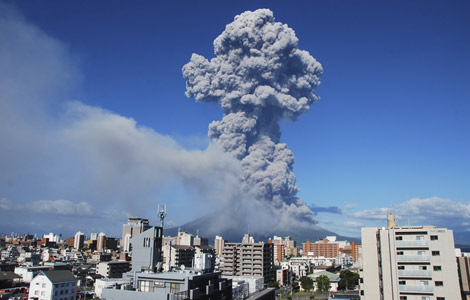Train chaos puts crisis management in question
Updated: 2013-08-19 06:10
(Xinhua)
|
||||||||
GUANGZHOU - Train services broke down in south China over the weekend, leaving thousands of passengers stranded at rail stations, angry with the rail company's inability to provide prompt information.
All trains at Guangzhou Railway Station, a major hub in south China, were suspended on Saturday midnight, after landslides blocked the railway artery from the southern metropolis to capital Beijing, according to Guangzhou Railway Corporation (GRC).
GRC estimated that over 80,000 passengers were affected.
The Beijing-Guangzhou Railway's section in Guangdong province reopened to traffic at 4:36 pm Sunday after 20 hours of repair efforts. However, more than 20 trains will still be suspended in the next three days, thanks to downpours and speed limit in various areas, according to the GRC.
Heavy downpours caused landslides and floods in north and east Guangdong province.
SLOW RESPONSE AGGRAVATES PASSENGERS
Thousands of people packed in the station square on Saturday, in heavy rain, found trains canceled and long queues for refunds.
Passenger Wang was heading for Sichuan province in southwest China and arrived at the station at 8:00 apmp. but there was no information about her train at all.
Wang follows GRC at Weibo, a Chinese microblogging platform, but she got nothing useful in the five hours that followed.
"I was at a total loss until noon, when the big screen said the trains were suspended," Wang said. "If they'd put the notice up earlier, I wouldn't have waited so long in the rain. And they didn't make it clear which trains were canceled."
Confused passengers like Wang could do nothing but wait anxiously at the station.
Situation worsened on Saturday afternoon. All check-in entrances were closed and guarded, but few railway staff were available for inquiries.
Passenger Huang Liyan was furious about the lack of information. "We cannot ask anybody about the trains. There is only the big screen and some unclear directions from the loudspeakers. I wonder why the railway staff aren't here to let us know what has happened."
Passengers are required to return their tickets within 48 hours to have a full refund, but the queues were hopelessly long.
As information spread later through social media and the Internet, the crowd began to thin in the evening.
The railway company has decided to extend the time for refunds to five days. All check-in counters at Guangzhou Railway Station were turned into refund counters on Sunday. Passengers were allowed to return tickets for a full refund at any station in the Province.
"We've opened 68 refund counters." said Wang Wei, deputy director of Guangzhou Railway Station. "Three million yuan ($490,000) cash were sent here last night. But we ran out of the cash only in a few hours. We're borrowing money from nearby stations." POOR INFORMATION
Snow and ice in south China caused enormous delays at Guangzhou Railway Station in 2008.
Since then, the Guangzhou government and the rail company have become more experienced in handling passenger overload, said a public management expert. "But their performance in informing the public is far from satisfactory."
"The train information is slow, unclear and poor channeled," said Cai Lihui, a professor of governance at Sun Yat-sen University.
"Train suspensions and delays began early in the morning, but the passengers had no idea which services were affected until nightfall," Cai said. "The rail company didn't make use of the Internet or mobile services."
Cai believes it is a matter of urgency for Chinese rail companies to build multi-channel information system, and to provide specific, clear train schedules.
Peng Peng, a senior researcher at Guangzhou Academy of Social Sciences, urged the government improve coordination in such emergencies.
"It's understandable that the rail company should focus on repairing broken tracks and taking care of the passengers inside the station. It might be beyond its capacity to keep the public space outside the station under control. The government should help."
Huang thought a full refund was not enough, "We should have compensation for the inconvenience."
China dissolved its Railway Ministry earlier this year, and the ministry's commercial functions were taken over by the China Railway Corporation.
"The rail company should pay more attention to customers, and work out compensation packages for suspension and delay," Peng said.
- Guangzhou rail service suspended, 80,000 affected
- Jinan station rebuilding project ‘another silly mistake’
- E China rail station to return to former glory
- China's railway carries more passengers in July
- Lijiang witnesses record increase in visitor arrivals
- Getting freight traffic back on the rails
- Construction work for Hu-Tong railway starts in Taicang

 Nadal beats Isner to win first Cincinnati crown
Nadal beats Isner to win first Cincinnati crown
 Azarenka beat Williams for Cincinnati title
Azarenka beat Williams for Cincinnati title
 500th eruption of Sakurajima Volcano in 2013
500th eruption of Sakurajima Volcano in 2013
 A cocktail that's a treat for the eyes
A cocktail that's a treat for the eyes
 Private sector to care for the elderly
Private sector to care for the elderly
 Be innovative, Li tells graduates
Be innovative, Li tells graduates
 Go online to reap the harvest
Go online to reap the harvest
 Williams ends Li reign to reach first Cincinnati final
Williams ends Li reign to reach first Cincinnati final
Most Viewed
Editor's Picks

|

|

|

|

|

|
Today's Top News
Baby formula sales to be shifted to pharmacies
Be innovative, Li tells graduates
Onus on US to improve military ties
Trustee council may be answer for reforming
40 killed as floods ravage NE China
Beijing, Moscow cooperate on floods
Home price rises slow in July
85 remain missing from Philippine ship collision
US Weekly

|

|








